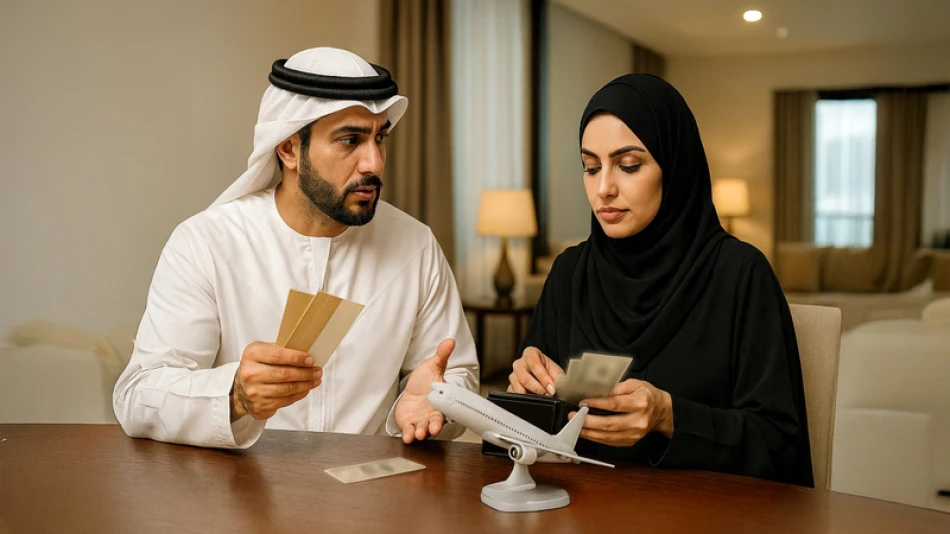
Spousal Expenses: The Key Requirement for Married Men's Travel Abroad
UAE Couples Redefine Financial Dynamics as Women Drive Shared Spending Revolution
A fundamental shift is reshaping household economics across the UAE, as working wives increasingly contribute to family expenses beyond basic necessities. This transformation reflects women's growing financial independence and challenges traditional gender roles in one of the Gulf's most progressive societies, signaling broader changes in how modern couples navigate financial responsibility.
The New Economics of Marriage
The traditional model where men shoulder all financial burdens is rapidly becoming obsolete in Emirati households. Women are now actively participating in funding luxury expenses such as international travel, premium hotel stays, and fine dining experiences. Some husbands have begun explicitly requesting their wives contribute to specific costs like flight tickets and hotel reservations.
This shift isn't merely about money—it represents a fundamental rebalancing of power dynamics within marriages. As one working wife explained, her participation in travel expenses "enhances my financial independence and creates balance in the relationship with my husband so he doesn't have an advantage over me."
From Necessity to Empowerment
The change stems from practical realities. UAE women now enter the workforce with strong educational backgrounds and often earn salaries comparable to or exceeding their husbands' incomes. The state's significant investment in women's education and career development has created a generation of financially capable wives who view contribution as both logical and empowering.
Several couples interviewed described scenarios where wives pay for entire family vacations while husbands handle daily expenses during trips. Others mentioned women gifting expensive items like cars and luxury watches to their husbands—reversing traditional gift-giving patterns.
Expert Analysis: Progress with Pitfalls
Family counselors and social experts view this trend positively but warn against potential exploitation. Dr. Lama Al-Safdani, a psychological and family consultant, notes that while role convergence between men and women is natural given women's workforce participation, the arrangement must remain consensual.
The key concern is coercion. Some men reportedly use bargaining tactics to force wives into contributing to basic household expenses, not just luxuries. This crosses the line from partnership into exploitation, experts warn.
Cultural Acceptance Grows
Social attitudes have evolved significantly. Dr. Ahmed Al-Barkani, a social guidance consultant, describes shared luxury spending as positive, provided both parties choose it willingly. He emphasizes that men remain legally and religiously obligated to cover essential expenses, but voluntary female contribution to non-essentials benefits everyone.
The practice has gained social acceptance, with men no longer feeling embarrassed to request financial participation from working wives for upscale experiences.
Regional Context and Global Trends
This development aligns with broader Gulf region trends toward gender equality and women's economic empowerment. The UAE's Vision 2071 and similar initiatives across the region prioritize female workforce participation, naturally leading to evolved household financial arrangements.
Similar patterns emerge globally in developed economies where dual-income households become standard. However, the UAE's rapid social transformation—compressed into just a few decades—makes this shift particularly pronounced.
Investment in Human Capital Pays Dividends
The UAE's substantial investment in women's education and career development is yielding measurable returns through enhanced household financial stability. When both spouses contribute economically, families can achieve higher living standards without over-leveraging through loans or credit cards.
Future Implications
This trend suggests UAE society is successfully balancing cultural values with economic pragmatism. Young Emirati couples increasingly view financial partnership as normal and beneficial, potentially creating more resilient family economic structures.
The evolution reflects maturity rather than abandonment of tradition. Men retain primary responsibility for essential expenses while women voluntarily enhance family lifestyle through luxury contributions. This model could serve as a template for other developing economies navigating similar social transitions.
As Dr. Maya Al-Hawari, a family relations consultant, observed, current-generation Emiratis demonstrate remarkable awareness of shared responsibility. They work hard together and spend wisely together, maximizing the opportunities their nation has provided while maintaining cultural identity and family stability.
Most Viewed News

 Sara Khaled
Sara Khaled






